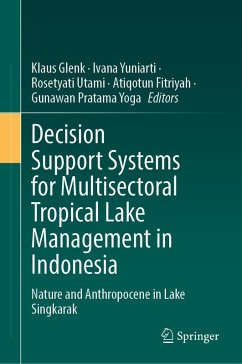
Decision Support Systems for Multisectoral Tropical Lake Management in Indonesia
Nature and Anthropocene in Lake Singkarak
Herausgeber: Glenk, Klaus; Yoga, Gunawan Pratama; Fitriyah, Atiqotun; Utami, Rosetyati; Yuniarti, Ivana
Versandkostenfrei!
Erscheint vorauss. 5. Januar 2026
117,99 €
inkl. MwSt.

PAYBACK Punkte
59 °P sammeln!
This book highlights the development of DSS and presents their application and the lessons learned from the obtained silver lining. The novel DSS integrates silo models (hydrology, water quality, fisheries, species distribution models, GIS, and economic models), manifests the spirit of interdisciplinary studies, and bridges academic sovereignty is the principal appeal of the book. Moreover, the science, the interplaying governance system, and the challenges behind the development of the DSS are fascinating as they provide valuable lessons for lake-related scientists and decision-makers, sugg...
This book highlights the development of DSS and presents their application and the lessons learned from the obtained silver lining. The novel DSS integrates silo models (hydrology, water quality, fisheries, species distribution models, GIS, and economic models), manifests the spirit of interdisciplinary studies, and bridges academic sovereignty is the principal appeal of the book. Moreover, the science, the interplaying governance system, and the challenges behind the development of the DSS are fascinating as they provide valuable lessons for lake-related scientists and decision-makers, suggesting that the book can be both informative and beneficial for practitioners and academicians, particularly in the Global South countries. The digital era has brought transformative decision-making around the globe. However, adopting decision-support systems is lagging in lake management, particularly in the Global South nations. The lakes, typically in tropical regions, undergo massive anthropogenic and natural pressures, creating intense degradation under uncertain conditions. This circumstance is further exacerbated by the lack of evidence and data to aid the decision-making process. Indonesia, home to more than 800 tropical lakes, is a great reference for understanding the situation. The large demography, growing economy, relatively low human resources development index, and increased extreme weather have simultaneously pressurized its lake ecosystems. Therefore, eutrophication, sedimentation, and conflicts over water use are the country’s common stories. Further, there have been very scarce evidence-based decision-making processes in the lake planning and monitoring system. Hence, developing a user-friendly decision support system (DSS) is imperative in the regions.


